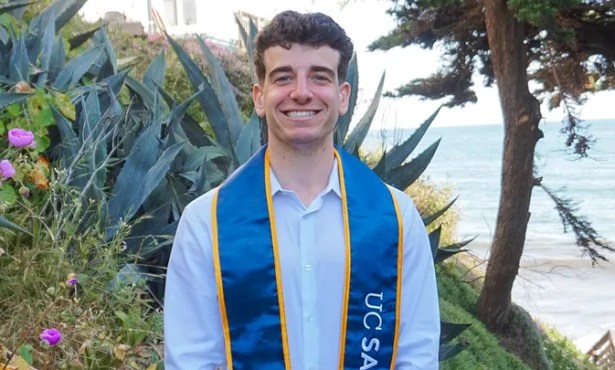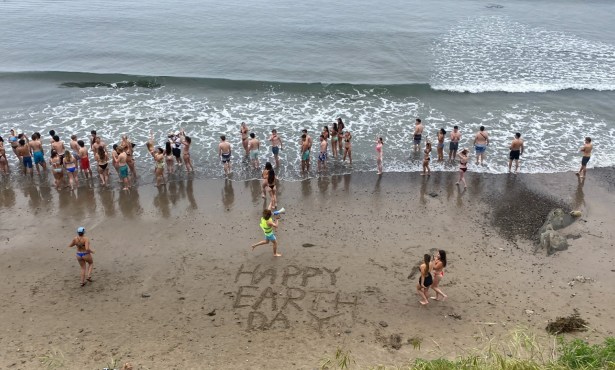Cosmetic Stores Get Under Skin of State Street Business Owners, City Attorney
Santa Barbara Officials Beginning to Crack Down on Secretive Locations
City Attorney Ariel Calonne met with Santa Barbara business owners last Tuesday who voiced concern over the aggressive sales tactics of cosmetic stores multiplying along State Street and in the Paseo Nuevo shopping mall.
The merchants told Calonne that the pushy approach of cosmetics employees — standing outside their stores and sometimes in the middle of walkways to hand out samples and solicit passersby — are harming adjacent businesses. They said shoppers often give the areas a wide berth to avoid being hassled, which robs their stores of customers.
“These places create a force field around them,” complained Scott Gauthier just before his sister Michelle met with Calonne. Gauthier’s jewelry store sits directly next to Adore Organic Innovation at 923 State Street, which is operating without a business license. “They’re so confrontational,” he said. “I’ve watched people cross the street just to get away from them. And jewelry is small scale — we need people to be close to our window.”
Gauthier said he tried speaking with Adore managers “to make things more neighborly” and to ask that their sales staff not walk out onto the sidewalk. “Being nice didn’t work,” Gauthier said. So he hired a full-time security guard to sit outside his front door and make sure Adore employees stay put. “I’m literally paying to keep these people at bay,” he went on, noting that sidewalk sales without a specific permit are illegal per a city municipal code that prevent stores from even setting up small signs outside their entryways.
Gauthier said his store managers have called the police more than a dozen times to report Adore sales staff infringing on public space, and that officers have issued them a number of tickets. Now, Adore workers jump back anytime they see uniforms approaching, Gauthier claimed. “We don’t want to damage their business,” he said, “but we want them to follow the rules and be respectful.”
Erica Dahl, owner of Savvy at 911 State Street, has the same complaints about her new neighbor, Gold Elements. She also said the cosmetic store’s employees chain-smoke outside her back door, refuse to break down boxes, and show a general lack of respect for fellow merchants. “They’re the worst,” she sighed. Dahl expressed surprise at the store’s peculiar layout given State Street’s notoriously high rents — its sales area occupies only the front quarter of its floor plan and is separated by a temporary partition from a completely vacant back area.
Over at Vine Vera at 1101 State Street, a cosmetics store with similarly cocky sales people and also operating without a business license, a leaking water conditioner on the store’s roof recently flooded the basement of French Press next door. French Press owners stopped the leak and drained their basement, but it took them days to locate and contact Vine Vera managers, who said they were aware of the issue but assumed it was the coffee shop’s problem to deal with.
Other downtown business owners, including those near cosmetic store Oro Gold in Paseo Nuevo, have relayed stories and grievances of their own to The Santa Barbara Independent. Many, however, spoke off the record for legal reasons or because they said they feared retaliation from the cosmetics employees. Some of the angry business owners wondered aloud about the responsibility of property managers in such situations.
It’s not clear how directly connected each location is to one another, but all four — a fifth is rumored to be opening in Paseo Nuevo in the coming months — employ parallel systems of products (“rejuvenating” makeup and facial services that cost hundreds to thousands of dollars), sales techniques (persistent and borderline belligerent), sales floor décor (modern and minimalist), uniforms (all black), and workers (commonly young Israelis).
Gold Elements and Oro Gold sell skincare merchandise they claim are infused with “trace elements of gold” that give wearers a “youthful appearance.” Vine Vera sells makeup that reportedly contains resveratrol, an antioxidant found in wine grapes. Adore Organic Innovation says it offers natural products that utilize its patented “Plant Stem Cell formula” and flecks of gold, just as in the makeup worn by Cleopatra.
Similar stores operating in similar downtown districts — Santa Monica, Pasadena, Long Beach, and other locations around the country — have drawn their own share of protests. Oftentimes, they sell from kiosks rather than actual storefronts. Speaking for Santa Barbara, Downtown Organization director Maggie Campbell said, “If all businesses had their staff working outside their front doors and hawking their goods/placing their merchandise on public sidewalks, it would be uncomfortable for most patrons.” The Santa Barbara locations began opening in the last 18 months.
A City Hall records search revealed that Oro Gold in Paseo Nuevo is also doing business without a license. On sale at the location is a “Mousse Perfecting Foundation” for $98, “Neck Lift Cream” for $198, and facemasks said to contain 24-carat gold for $1,398. Multiple messages left with the listed owners of the three unpermitted locations have not been returned, though the companies’ convoluted corporate structures involve different investment firms and LLCs (Mazal Enterprises, Dead Sea Cosmetics, and others out of Israel) and make it nearly impossible to determine the true identities of the principals. The phone number listed for the owner of Gold Elements, which is legally permitted, has been disconnected. When interviewed by reporters, store managers say they cannot speak to any disagreements with neighbors or issues with their business licenses. They then offer free samples. One of them admitted the majority of his customers are tourists who will likely never return to his store.
City Attorney Ariel Calonne said the information he received from affected State Street merchants last Tuesday caused him “serious concern.” On the sidewalk sales front alone, he said his office would be working with police to determine what legal recourse is available to them. And with regard to the stores’ business licenses — or lack thereof — he said that issue “may be indicative of other unlawful business practices. �� There’s probably a lot more going on than simple code violations.” Calonne said he and city staff are also examining “more exotic” means of investigation and enforcement but explained he wasn’t able to speak publicly about those strategies yet.
Beyond the local uproar, consumer complaint forums, Better Business Bureau files, and Yelp reviews across the country are brimming with unhappy customers claiming to have been scammed by lying sales staff pushing useless products. The most common gripe is that cosmetic store employees — who sometimes claim to be trained cosmeticians — promise their goods are returnable if a customer is not satisfied. The assurance is made verbally, but fine print on receipts states all sales are final, the complaints read.
There are also allegations of outright deception and fraud. Dead Sea Cosmetics–affiliated kiosks were kicked out of New Zealand entirely when workers there convinced an autistic man to buy $4,400 worth of merchandise and, in another instance, sold $17,000 worth of products to a man with short-term memory loss who couldn’t remember purchases he had made just moments earlier. Closer to home, an elderly woman with Alzheimer’s — the mother of a downtown employee working next to one of the cosmetic stores — was reportedly swindled out of $800.
A September 2014 article in The Times of Israel took an investigative look at the proliferation of suspicious Dead Sea Cosmetics–related businesses around the world. The story details how many young Israelis pursue work with the companies to pay for their post-army travels, and how the U.S. Department of Homeland Security and Department of Labor has been investigating the organizations since at least 2007.
In a January 2010 cable wired from the U.S. embassy in Tel Aviv to federal law enforcement agencies — and then picked up and published by WikiLeaks — a laundry list of alleged financial shenanigans is described in connection with Dead Sea Cosmetics. It reads, in part:
The Dead Sea industry has spread to more than 36 states, creating a major presence across America. This industry also operates in countries like Australia, New Zealand, the UK, and Germany. Unfortunately, its U.S. presence is not entirely “clean,” for there are known issues of B1B2 visa holders working illegally; illegal worker exploitation; no federal or local taxes being paid on workers’ earnings; filing applications for extensions and/or changes of status as a means of continuing illegal work; bogus marriages to keep key staff in the United States; B1 in lieu of H3 letter and H3 visa scams; non-transparent corporate structures established to create distance from illegal workers; transport of huge sums of cash to Israel suggesting organized crime and money laundering; as well as an increased number of real estate ventures that suggest the same. Moreover, it is culturally acceptable for post-army Israelis to work illegally in the United States; key parts of the Dead Sea industry have been able to base a large part of their business models upon the employment of illegal workers.
Read the full WikiLeaks cable here.



